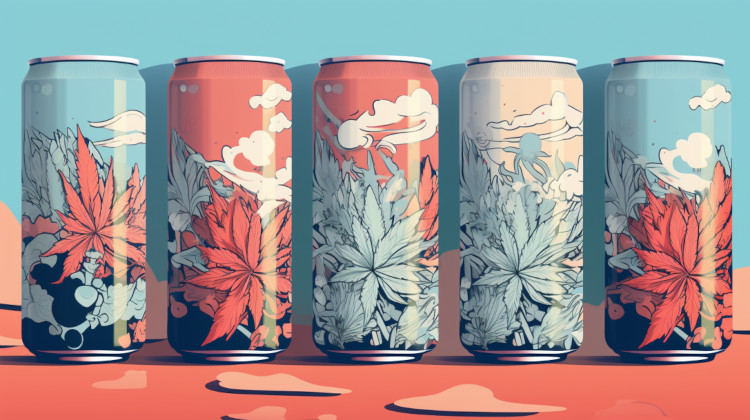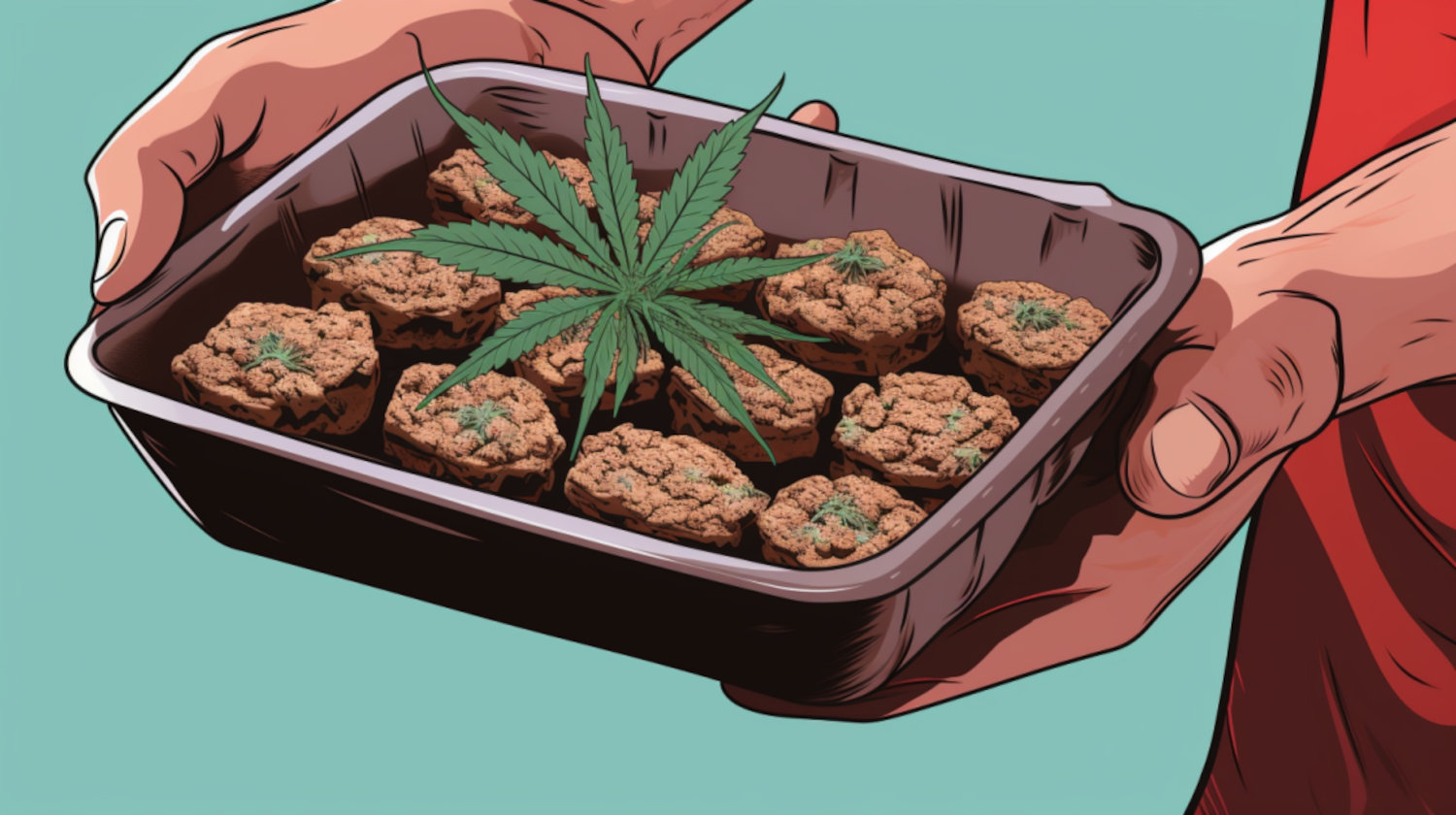In This Article
In recent years, edibles have emerged as a highly popular method of cannabis consumption across legal states. Edibles, which include a variety of products like baked goods, gummies, and chocolates, offer users a discreet alternative way to experience the effects of cannabis.
In some regions, like Colorado, edibles account for nearly half the total cannabis sales, showing just how much edibles are favored by both medical and recreational users.
Why are edibles so popular?
Compared to smoking or vaping, they provide a delayed but longer-lasting and more intense high, despite having a relatively lower bioavailability than other consumption methods.1
Given their increasing popularity and the unique way they interact with the body, it raises a crucial health question: Are edibles bad for your liver? Considering the liver’s vital role in metabolizing substances, it’s important to explore the potential impact of edibles on this essential organ.
What are Edibles?
Edibles are a unique and increasingly popular method of consuming cannabis. Essentially, they are food products that have been infused with cannabis extracts.
The diversity in edibles is vast – ranging from baked goods like brownies and cookies to candies, gummies, chocolates, lozenges, and even beverages. They can be crafted at home for personal use or manufactured commercially for sale in dispensaries.
Popular Types of Edibles
Because of their popularity and ease of use, there are a wide variety of edibles on the market today.
Gummies are a favorite for many due to their convenience, variety of flavors, and controlled dosage. Chocolates and baked goods, like the classic cannabis brownie, are also highly sought after for their rich flavors and satisfying texture. Beverages, ranging from teas to sodas infused with cannabis, are gaining traction for those seeking a refreshing alternative.
Benefits of Edibles
Why are people increasingly choosing edibles over other consumption methods? There are several reasons:
- Discretion and Convenience: Edibles offer a discreet way to consume cannabis without the telltale smell associated with smoking. They're compact and odorless nature makes them easy to carry, consume, and dose.
- A Different High Experience: Many users report that the high from edibles is more calming and relaxing compared to smoking or vaping. This difference is due to how the body processes THC when ingested, leading to a longer-lasting and often more intense experience.
- Avoidance of Toxins: Unlike smoking, which can expose the user to harmful toxins and irritants, edibles bypass the lungs entirely. This makes them a safer option for those concerned about the respiratory risks associated with smoking.
- Controlled Dosage: Especially with commercially prepared edibles, users can know exactly how much THC they are consuming, which can be challenging with smoking or vaping.
- Longer Duration: The effects of edibles last significantly longer than smoking or vaping, making them a preferred choice for those seeking prolonged relief.
- Varied Options: The variety of edibles available caters to different taste preferences and dietary restrictions, making them accessible to a broader range of users.
What Does the Liver Do in the Body?

While we often hear about the importance of the heart or brain, the liver, one of our largest organs, plays an equally vital role in our overall health. But what exactly does this powerhouse organ do?
- Processing Nutrients: One of the liver's primary roles is to process the nutrients absorbed from the small intestine. It converts these nutrients into forms that our body can use, stores them, and supplies cells with them when needed.
- Detoxification: The liver acts as a filtering system, detoxifying and clearing harmful substances from our blood. This includes a range of toxins, from environmental pollutants to alcohol.
- Medication Metabolism: When we take medication, it's the liver's job to break it down into substances our body can use. It's an essential step in ensuring that medicines work as intended.
- Producing Essential Proteins and Cholesterol: The liver produces vital proteins that help clot blood. It also produces cholesterol and unique proteins that help carry fats through the body.
When we over-consume harmful substances like alcohol, it can overwhelm the detoxification process in the liver, leading to liver damage over time. This is because the liver can only metabolize a small amount of alcohol at a time, leaving the excess to circulate through the body.
Similarly, with medications, the liver works to break them down, but certain drugs can be hard on this organ, primarily when used in large amounts or for extended periods.
How are Edibles Metabolized?
When we consume edibles, the body processes them differently compared to inhalation methods like smoking or vaping. Inhaled cannabis allows THC to enter the bloodstream directly through the lungs, leading to a faster onset of effects, while edibles introduce cannabinoids through the digestive system.
Once ingested, the active compounds in edibles undergo a "first-pass metabolism" in the liver. During this process, the liver uses enzymes, predominantly from the cytochrome P450 system, including CYP 2D6 and 3A4, to metabolize these cannabinoids. This enzymatic action transforms THC and CBD into forms that the body can use and then excrete.2
Because these active compounds are highly lipophilic (lipid soluble), they have a low oral bioavailability – only about 6% of these compounds are absorbed when consumed as edibles, a stark contrast to inhalation methods, where absorption is significantly higher.
This extensive metabolism in the liver results in lower concentrations of THC and CBD in the bloodstream and delayed onset of their effects, typically peaking around 120 minutes after ingestion.3
While there have been concerns about the impact of cannabis on the liver, current research, including small prospective studies, does not strongly link cannabis use with liver injury. Rare case reports of liver injury exist, but they are neither well-documented nor convincing as the direct effects of cannabis. This suggests that cannabis, particularly in the form of edibles, does not appear to cause acute liver injury or worsen pre-existing liver conditions.
Is Weed Bad For Your Liver?

Cannabis use has become increasingly prevalent due to the plant compound’s intoxicating and medicinal properties. As more users turn to these products for medical or recreational use, understanding the interaction between cannabinoids like THC and the liver becomes crucial.
According to current scientific research, there is no substantial evidence that suggests cannabis causes acute liver injury. This finding is significant, especially considering the liver's role in metabolizing substances, including THC and CBD found in cannabis. However, the absence of substantial evidence of liver damage does not eliminate the need for caution.
Some users may be concerned about the potential relationship between THC and fatty liver disease. Current clinical research has found that cannabis use does not appear to worsen pre-existing liver diseases. This insight is crucial for individuals with existing liver conditions who might consider using cannabis for medicinal purposes.
Can Edibles Cause Elevated Liver Enzymes?
Elevated liver enzymes can be indicative of inflammation or damage to the liver. This could be due to various factors, including medications, alcohol use, or certain health conditions.
When damaged, liver cells may release excess chemicals, such as liver enzymes, into the bloodstream. While most causes of elevated liver enzymes are temporary, others are more severe.
In terms of cannabis’ effect on liver enzymes, current research suggests that the frequency and severity of liver enzyme and bilirubin elevations during cannabis use, which includes edible consumption, are not clearly defined.
In small-scale studies, no significant biochemical abnormalities have been observed with the use of cannabis. This suggests that, at least in these studies, cannabis consumption did not result in elevated liver enzymes.
While there have been rare case reports suggesting acute liver injury related to cannabis use, these instances are neither well-documented nor convincingly attributable directly to cannabis. This ambiguity points to the need for more detailed research in this area.
With regard to CBD, a non-intoxicating compound found in cannabis, the findings are encouraging.
A study on the impact of long-term consumption of oral CBD on liver function indicates that self-medication with CBD does not seem to be associated with an increased prevalence of liver enzyme elevation. Researchers believe most of the enzyme elevations found in the study may be caused by the conditions or medications for which the individuals were taking CBD.4
Are Edibles Bad For Your Liver?

Current scientific research does not provide substantial evidence linking the consumption of cannabis, including edibles, with liver injury. However, despite the lack of evidence of a negative interaction between THC and the liver, caution is recommended.
While the cannabis in edibles may not do much damage, other ingredients may indirectly impact liver health. For example, frequent consumption of edibles containing high levels of sugar, fats, or salt can be detrimental to liver health, especially in individuals with pre-existing liver conditions.
Moderation in the consumption of edibles, along with a balanced diet rich in fiber and low in unhealthy fats and sugars, is advisable.
Tips For Minimizing Possible Risks
While research continues to explore the full impact of cannabis, particularly edibles, on liver health, there are steps users can take to minimize potential risks. Being informed and cautious can make a significant difference in ensuring a safer experience.
- Monitor Dose and Frequency: Start with a low dose, especially if you're new to edibles, as their effects can be more potent and longer-lasting than other forms of cannabis. Be mindful of how often you're consuming them. Overuse can not only increase tolerance but might also stress the liver.
- Be Aware of Other Ingredients: Edibles often contain other ingredients like sugars, fats, and preservatives. Consider the overall health impact of these ingredients, particularly if you have dietary restrictions or health concerns.
- Avoid Crossfading: Mixing cannabis with alcohol, known as crossfading, can be hard on your liver. Alcohol and THC both require liver processing and combining them could amplify the strain on this organ.
- Consult Your Doctor: Before using cannabis, especially if you're considering it for medicinal purposes or if you're on other medications, talk to your doctor. They can provide guidance tailored to your health needs and help you understand potential drug interactions.
- Understand Interactions and Liver Strain: Cannabis can interact with various medications and might affect liver enzymes. Being aware of these interactions and the signs of liver strain is crucial.
- When to Be Concerned: If you experience unusual symptoms after using edibles, such as severe abdominal pain, nausea, or significant changes in mood or perception, seek medical help. These could be signs of overconsumption or an adverse reaction.
- Maintaining Liver Health: In addition to being cautious with cannabis use, maintaining overall liver health is essential. A balanced diet, regular exercise, and avoiding excessive alcohol consumption are key.
Edibles: A Liver-Friendly Option?
As research evolves, it keeps shedding light on how we can enjoy the benefits of cannabis while being mindful of our health. By adopting informed and cautious practices, users can appreciate the unique experiences that edibles offer, with a positive focus on well-being and safety. Remember, the key to a rewarding cannabis experience lies in balance, awareness, and proactive health management.
References
- Barrus DG, Capogrossi KL, Cates SC, et al. Tasty THC: Promises and Challenges of Cannabis Edibles. Methods Rep RTI Press. 2016;2016:10.3768/rtipress.2016.op.0035.1611. doi:10.3768/rtipress.2016.op.0035.1611
↩︎ - Marijuana. In: LiverTox: Clinical and Research Information on Drug-Induced Liver Injury [Internet]. National Institute of Diabetes and Digestive and Kidney Diseases; 2012. https://www.ncbi.nlm.nih.gov/books/NBK590051/
↩︎ - Lucas CJ, Galettis P, Schneider J. The pharmacokinetics and the pharmacodynamics of cannabinoids. Br J Clin Pharmacol. 2018 Nov;84(11):2477-2482. doi: 10.1111/bcp.13710. Epub 2018 Aug 7. PMID: 30001569; PMCID: PMC6177698.
↩︎ - Kaufmann R, Aqua K, Lombardo J, Lee M. Observed Impact of Long-term Consumption of Oral Cannabidiol on Liver Function in Healthy Adults. Cannabis and Cannabinoid Research. 2021;8(1). doi:https://doi.org/10.1089/can.2021.0114
↩︎
The information in this article and any included images or charts are for educational purposes only. This information is neither a substitute for, nor does it replace, professional legal advice or medical advice, diagnosis, or treatment. If you have any concerns or questions about laws, regulations, or your health, you should always consult with an attorney, physician or other licensed professional.




